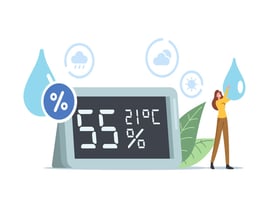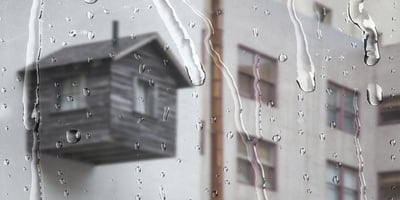What is The Best Humidity Level for a Home in Summer? Make The Humidity Ideal
The amount of water vapor in the air is called humidity. Humidity is a really important part of how comfortable and healthy a place is inside, especially in the summer. Learning about ideal indoor humidity levels and how to measure them can help you keep your home in great shape.
Humidity varies the way we perceive temperature and can affect our health and the state of our houses. When the humidity is low, the air can feel very dry; when it is high, it can feel warmer than it actually is.
Absolute humidity and relative humidity are the main ways to define the level of humidity.
Relative Humidity
In most cases, relative humidity, or RH, is used to define humidity. It is stated as a percentage and reflects the relationship between the amount of moisture that exists in the air and the amount it is theoretically possible to have in the air at a specific temperature. For example, if it's 50% relative humidity, it means the air holds only half of the amount of water that it can at that temperature. With a change in temperature, RH can vary significantly; hot air is able to hold more water than cooler air.
Absolute Humidity
Absolute humidity shows the amount of water vapor present in the air, regardless of temperature. It is usually depicted in grams of water vapor per cubic meter of air (g/m3). Absolute humidity does not change, whatever the temperature, and gives a clear indication of the amount of water vapor already in the air.
Understanding these two measurements is important, as they will tell you different things about how wet your house is. Absolute humidity is useful for technical and scientific tasks, and relative humidity is helpful in everyday applications, as it has a direct impact on health and comfort.
Monitoring these humidity levels will give you insight into whether you should use humidifiers, dehumidifiers, or other appliances to keep your home comfortable and healthy this summer.
Optimum Levels of Humidity This Summer
It's very important to keep the right humidity level in your house during the summer for comfort, health, and the longevity of your possessions. If you hit the right mix, you will be able to avoid many problems that arise from either too much humidity or too little humidity.
Suggested Humidity Range
During the summertime, the proper humidity inside the house should range from 40% to 60%. This range is comfortable and healthy and prevents some health and home maintenance problems. By keeping the humidity of your house in this range, the air will neither be too warm nor too dry nor too damp to breathe comfortably in.
Benefits of Maintaining Proper Humidity
A number of benefits come with keeping warm air in your home at the proper amount of humidity:
- Improved Comfort: With proper humidity levels, air may feel cooler and more pleasant. Thus, one may not have to set the air cooler as much, resulting in reduced energy bills.
- Household Item Preservation: Proper humidity protects wood furniture, musical instruments, books, and electronic devices from excessive drying or wetness.
- Better Air Quality: When humidity levels are balanced, dust mites, mold, and other allergens are less likely to spread, improving indoor air quality.
Controlling humidity will help your HVAC to work effectively; it will help save you energy dollars.
Effects of Incorrect Levels of Humidity on Health
Incorrect levels of humidity can result in a variety of health issues, including:
High Humidity
- Respiratory problems: Too much moisture can increase respiratory problems, particularly in people with asthma and other allergic reactions. Allergens like mold, mildew, and dust mites love warmer weather.
- Heat-related illnesses: Higher humidity makes the temperature feel higher than it actually is, increasing the risks of heat exhaustion and heat stroke.
Low Levels of Humidity
- Dry, itchy skin: Low humidity may be drying out your skin and itching your eyes while it's irritating your lungs. It can also make your nose bleed and dry out the mucous membranes.
- Increased vulnerability to illness: Dry air can suppress the mucous membranes' ability to trap and expel viruses and bacteria, making one more susceptible to the common cold and other diseases of the respiratory tract.
Knowing and maintaining the optimum humidity range for your home during summer will help you improve your comfort, protect your health, and preserve your belongings. Correctly measuring and adjusting indoor humidity levels through regular use of the right tools and techniques will significantly enhance the quality of life.
How to Maintain Optimal Levels of Humidity?
During summer, maintaining the optimal humidity in your home means using a combination of tools and techniques to achieve balanced wetness in the air. Here are some valuable tips that will help you achieve and maintain the proper levels of humidity.
Dehumidifying Techniques
Dehumidifiers are crucial tools for removing excess moisture in the air. They come in particularly handy in humid and hot places and during summer.
Choosing the Right Dehumidifier
- You should opt for a dehumidifier capable of handling the room's size. Smaller units can work well in bedrooms and small living rooms, while larger units are required in basements and big rooms.
- Other features to look for include adjustable humidity levels, auto shut-off, and continuous drainage options. Energy-efficient models also reduce the power bill.
Installation and Maintenance
- Place the dehumidifier in the middle of the room where there is excellent air movement. Ensure it does not touch the walls or furniture for easy air circulation.
- Clean the filter regularly, empty the water tank, and replace any damaged parts. Check for wear and tear to ensure the parts work well.
Using Humidifiers
Humidifiers moisten the air without excessive moisture. They are, therefore, useful in dry environments or when indoor air conditioning lowers the humidity level below average.
How to Choose the Best Humidifier?
- Humidifiers come in various styles, such as ultrasonic, evaporative, and steam heaters. Choose the one that best suits your desires and the size of the room.
- Ensure that the fan can handle the room's load. Smaller units are best used in bedrooms, while larger units function better in living rooms and larger rooms.
Maintenance and Cleaning
- The humidifier should be cleaned regularly to prevent mold and insect growth. The tank and parts are cleaned in a solution of water and vinegar.
- Replace filters as the manufacturer requires. Ensure that the water used is clean and free from all impurities to avoid buildup and pollution.
Air Conditioning Systems
Air conditioning systems play an integral role in controlling air temperature and the level of humidity inside. If they are properly maintained, the best levels of humidity can be maintained.
The Right Way to Use Air Conditioners
- If possible, use the "dry mode" or "dehumidify" setting. It helps to eradicate excess moisture in the air without making the room too cold.
- Use fans in the kitchen and bathroom to expel the extra moisture created by cooking and washing to allow for adequate airflow.
Regular Maintenance
- To ensure that your system is working well, clean or replace the air filters on a regular basis. Clogged-up filters decrease the ability of air to flow and dehumidify.
- Allow a professional to check and service your air conditioner regularly as part of routine maintenance checks. This will help identify problems that affect temperature control and fix them.
By applying these tips and using the proper equipment, you can maintain the humidity in your home at the right levels all summer and winter long.
What to Avoid? Common Mistakes
To achieve the perfect humidity level inside the house, it is important to take great care with your air conditioners, humidifiers, and dehumidifiers. By avoiding these common mistakes, you will be able to keep your home healthy and comfy.
Overuse of Dehumidifiers and Humidifiers
Even though humidifiers and dehumidifiers are important devices for controlling high indoor humidity here, overusing them can be harmful.
- If you run a dehumidifier continuously, it will dry the air too much, leading to dry skin, sore airways, and more static electricity. Music instruments and wood furniture can even become damaged.
- If a humidifier is used excessively, it will moisten the air too much, which will foster the development of mold, dust mites, and other allergens. It may also exacerbate breathing problems and pain.
- Use a hygrometer to check the indoor humidity level and adjust the settings of your humidifier or dryer to keep the level between 40 and 60%.
Lack of regular maintenance
Failure to properly maintain home humidity control devices and HVAC systems daily can lead to less effective and efficient performance.
- Mold and bacteria can grow in humidifiers that aren't cleaned regularly. These germs can then spread into the air and make people sick.
- Failure to clean the dehumidifier regularly may result in clogged filters, less efficient performance, and potential issues with water leakage.
- Poor maintenance of an air conditioner can cause it not to cool well, increase energy bills, and cause people to have a hard time regulating the home's temperature.
- Always follow the care instructions that come with the gadget. Clean the filters and water tanks on a regular basis, and have your HVAC systems serviced by a professional every so often.
By avoiding these common mistakes and following proper care, you can control the humidity level of your home and ensure that it is a healthy and comfortable place to live.
Keeping your house at a proper humidity level in summer would be necessary for your comfort, health, and the life of your possessions. Keeping the level between 40 and 60% makes for a nice place to live. Be clever with your use of dehumidifiers, humidifiers, and air conditioners, and be sure to maintain everything regularly. You can have the perfect indoor environment to safeguard health and home preservation by being vigilant and adjusting humidity levels.


































.jpg)


.jpg?height=200&name=6431%20(1).jpg)
